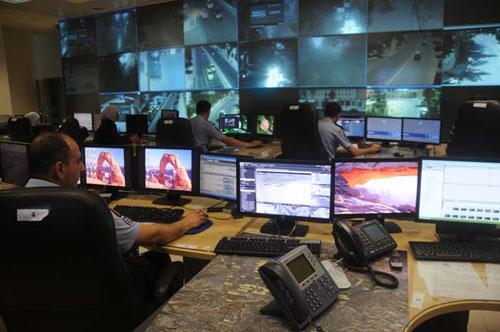You are here
‘911 service receives 600,000 emergency calls every month’
By Rana Husseini - Feb 07,2015 - Last updated at Feb 07,2015

AMMAN — As Jordanians anticipate another snowy spell this week, the Command and Control Centre (CCC) that handles 911 calls said it received over double the usual calls during last month’s blizzard.
“In the week of the storm from January 7 until January 14 we received around 434,000 calls, which is very high compared to the monthly average,” said Col. Maher Jarrah of the CCC, which is affiliated with the Public Security Department (PSD).
The official said the CCC receives between 18,000 and 25,000 calls on a daily basis or “around 600,000 calls per month”.
But on January 8, the official told The Jordan Times in a recent interview, “the blizzard started and on that day alone we received 86,000 calls.”
The majority of the calls, according to Jarrah, were people inquiring about the weather and power cuts.
“Other calls were from motorists who were trapped in the snow and needed help.”
The CCC was established in 2009 a few years after the 2005 Amman bombings that targeted three hotels and claimed the lives of some 60 people, and left dozens injured or maimed.
“The bombings triggered the establishment of this centre to unify efforts and communications between the concerned authorities,” Jarrah explained.
The 911 service started in Amman in its first years of operation, “and now it covers the entire Kingdom”.
“Our estimate is that around 3,000 of the daily calls are followed up on, while the rest would be inquiries about roads or weather conditions,” Jarrah said.
Anyone seeking to report any kind of emergency — be it a traffic accident, fire, or disturbances of any kind — should dial 911, he noted.
“We have 36 trained dispatchers working around-the-clock everyday and they refer the call to the concerned authority after inputting all the information into a special system,” the police official explained.
The dispatchers follow up until the emergency is dealt with and then write a report about the incident, Jarrah added.
The number of false calls is very low, according to the official, who said the number was higher when the service was first introduced but dropped to less than 1 per cent because “we started to legally prosecute people who make a false call.”
Jarrah said the PSD has conducted several awareness campaigns at schools to introduce the 911 service.
The CCC is also in charge of the closed circuit TV cameras, both fixed and mobile, that are installed on the Kingdom’s streets.
“These 500 closed circuit cameras are meant to keep an eye on the general situation and help in investigations as well as monitor traffic and issue citations when needed,” he added.
The cameras can also detect fake licence plates and “help our officers match vehicles with licence plates, because we had minor incidents of people exchanging licence plates, using fake ones or changing the colour of the vehicle”, he noted.
In addition, the CCC is in charge of a special number, 114, which is designed to serve the deaf community.
“This service is meant to help the deaf community, whereby we use sign language to receive their video calls and take the necessary action according to the case,” he said.
Deaf people can call 114 on any smartphone with Internet access to report emergencies.
Related Articles
The Interior Ministry on Wednesday said precautionary instructions on motorists’ mobility during the expected snowstorm will depend on how severe the blizzard is.
The Health Ministry said on Sunday its hospitals received 16,500 patients during the weekend blizzard.
The Central Traffic Department said on Monday it will track down owners of vehicles without licence plates, in cooperation with other security apparatuses, and take the necessary measures against them.















